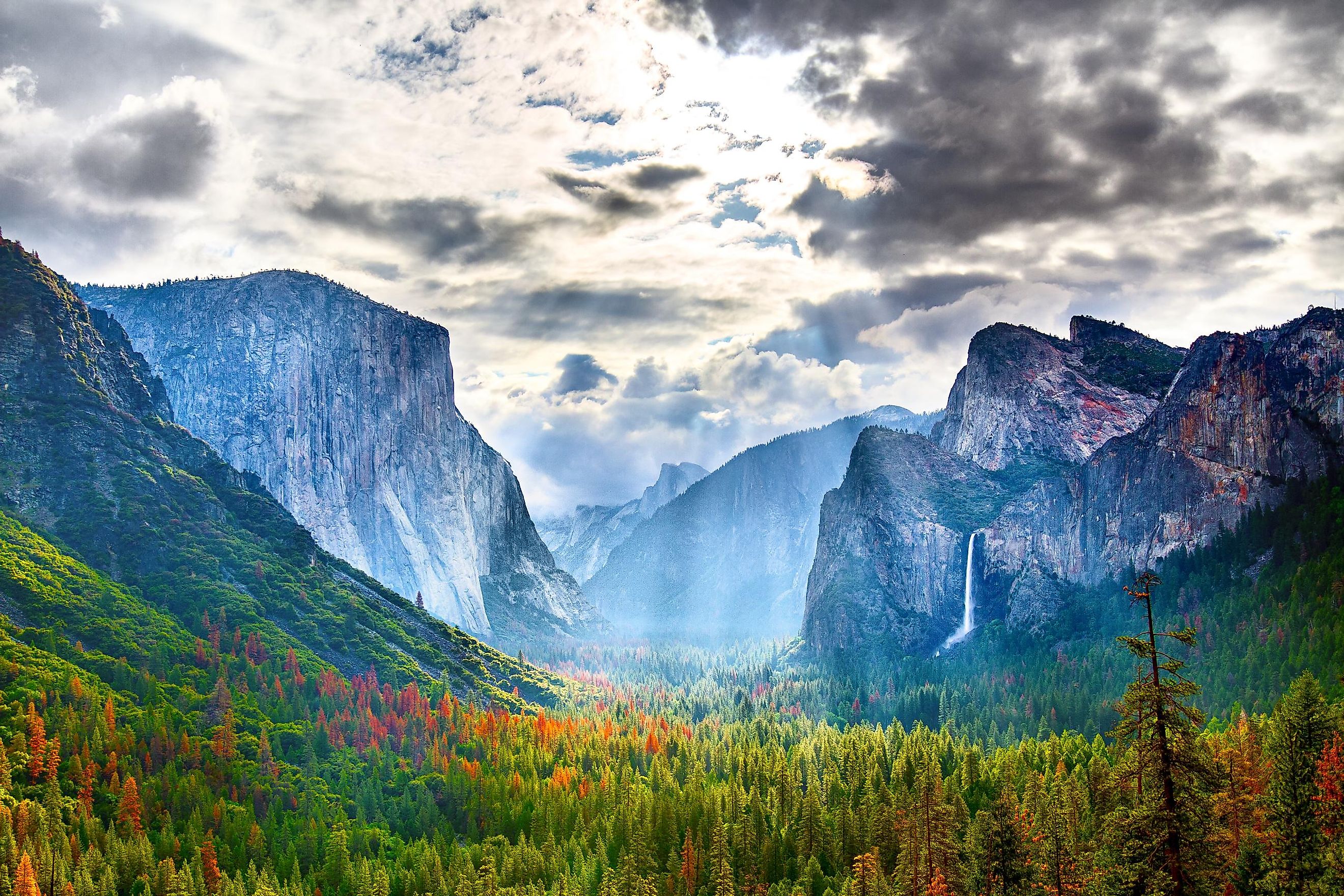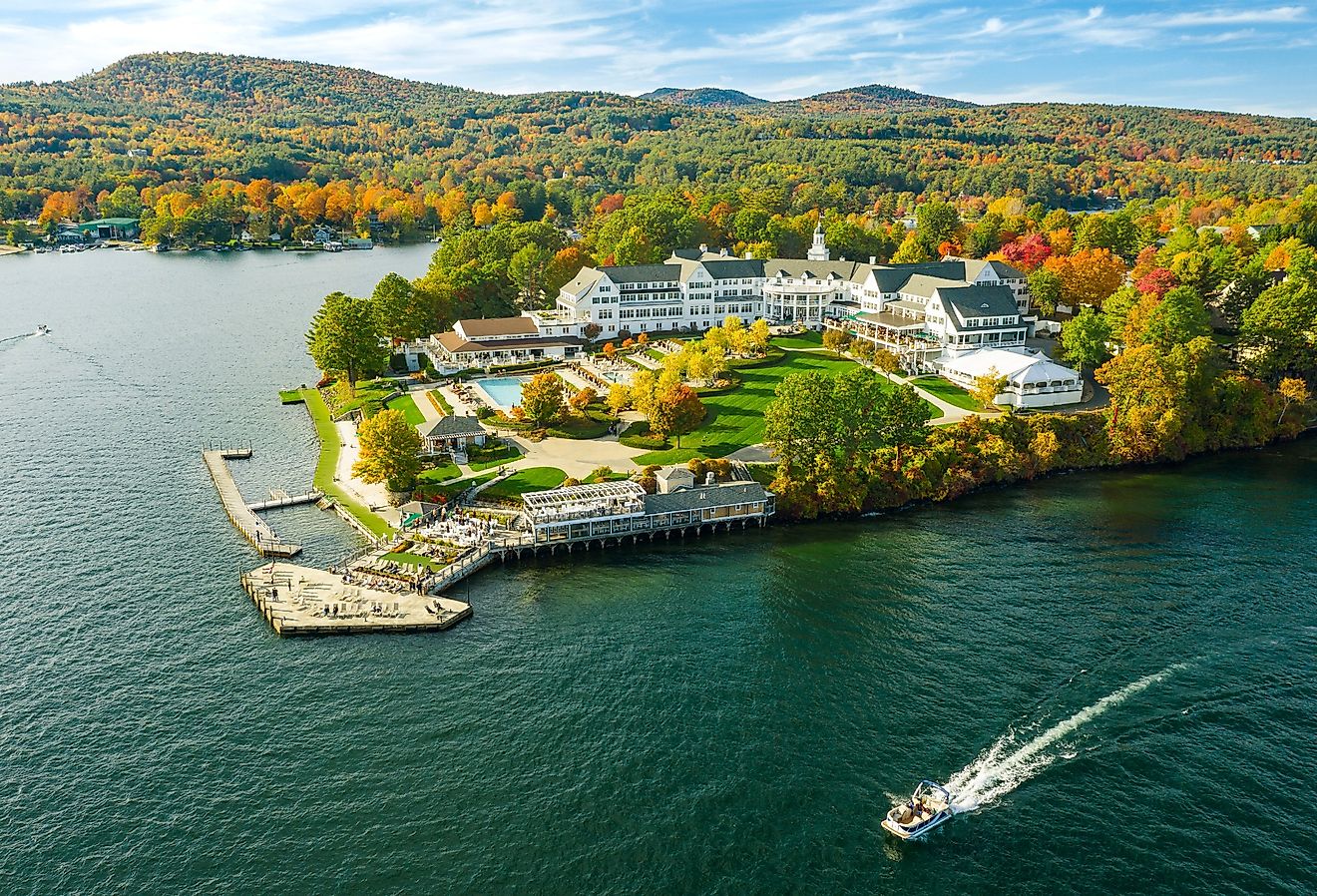
Yosemite National Park
National Parks are areas that are created by national governments for the conservation of the natural landscape, protection of the diverse flora and fauna and their habitats, and the recreation of the general public. The National Park Service currently manages 63 National Parks in the United States. With an area of 423,970 km2, the State of California is geographically positioned in the western (Pacific) region of the United States. Among all the US States, California contains the highest number of national parks and features the most diverse series of landforms.

Situated in east-central California in the heart of the Sierra Nevada Mountain Range is the Yosemite National Park. The park is surrounded by the Sierra National Forest and Ansel Adams Wilderness area in the southeast, the Hoover Wilderness area in the northeast, the Stanislaus National Forest in the northwest, and the Emigrant Wilderness area in the north. Yosemite National Park occupies an area of 3,028 km2 and is spread across the counties of Tuolumne, Mariposa, Mono, and Madera. Established in 1890, Yosemite is the third oldest National Park in the United States.
Geography

Yosemite National Park is widely known for its granite cliffs, glaciers, deep valleys, waterfalls, lakes, streams, grand meadows, giant sequoia groves, and immense biological diversity. It is also one of the least fragmented habitats in the Sierra Nevada region and approximately 95% of the National Park area is a designated wilderness area under the United States National Wilderness Preservation System.

The Tuolumne and Merced Rivers begin within the boundaries of the park and flow westwards to California’s Central Valley. There are about 3,200 lakes, 2,700 km of streams, and two reservoirs in the park, all of which help to form the large watersheds of the Merced and the Tuolumne Rivers. Numerous tall mountain peaks are located in the southeastern area of the park. Mount Lyell, which rises to an elevation of 3,997 m, is the highest point in the Yosemite National Park. The Lyell Glacier, which is considered to be one of the last remaining glaciers in the Yosemite area, is a part of the Mount Lyell Mountain peak. Several deep U-shaped valleys in the National Park were created due to glacial movement. One such notable glacial valley is the 12 km-long Yosemite Valley. Due to many glacial steps, hanging valleys, and sheer drops, the Yosemite National Park boasts a high concentration of waterfalls. Situated in the Yosemite Valley is the Yosemite Falls, which at a height of 739m is North America’s highest waterfall. Besides the Yosemite Falls, the other significant waterfalls in the park include Ribbon Falls, Bridalveil Falls, Vernal Falls, and Wapama Falls.

Half Dome is a large granite dome, located in the eastern portion of the Yosemite National Park. This giant dome rises to an elevation of 1,460 m above the floor of the Yosemite Valley and is named Half Dome due to its distinct shape. Another prominent rock formation that is situated near the western end of the Yosemite Valley is El Capitan. This granite monolith rises 2,308 m above sea level and serves as one of the world’s most famous rock-climbing destinations. Numerous sub-alpine meadows such as Dana Meadows and Tuolumne Meadows are also found in the Yosemite National Park.
According to the Köppen climate classification, the Yosemite National Park experiences a Mediterranean climate. The climate is greatly influenced by the park’s mountainous terrain and its location at higher elevations. The warm and hot summers are moderated by frequent summer thunderstorms, with daily high temperatures averaging 32 °C in the Yosemite Valley. The winters are cold and snowy, with freezing temperatures at higher elevations.
Wildlife

The vegetation of Yosemite National Park is quite well preserved in comparison to the surrounding areas, where the natural tree cover has been destroyed due to logging. The park contains about 912.6 km2 of old-growth forests besides having an extensive cover of meadows, alpine woodlands, and chaparral. The lower areas of the park are covered by mixed coniferous forests, shrubs, and meadows. At the Yosemite Valley, large stands of conifers, giant sequoias, western white pine, lodgepole pine, and mountain hemlock are found. There are three groves in the park which are made up of several old giant sequoia trees. These include the Mariposa Grove, Merced Grove, and Tuolumne Grove.

The varied habitats of the Yosemite National Park support more than 250 vertebrate species. Some of the common mammal species that are found in the lower elevation areas of the park include black bears, mountain lions, mule deer, coyotes, marmots, raccoons, bobcats, river otters, foxes, Sierra Nevada bighorn sheep, mountain beavers, pika, and bats. Reptilian species like the mountain kingsnake, northern alligator lizard, and rubber boa are found. Amphibian species like the Yosemite toad and Gilbert’s skink are also found.
Several avian species are found in the National Park including the white-headed woodpecker, Steller’s Jay, mountain bluebird, northern goshawk, western meadowlark, Clark’s nutcracker, spotted owl, and willow flycatcher.
Brief History

It is believed that the Yosemite Valley area was inhabited by the Indigenous Ahwahneechee for close to 3,000 years. In 1849, after the discovery of gold in California, several gold seekers and wood harvesters came to the area. This led to severe competition for land and resources between these newcomers and the Indigenous peoples, resulting in several violent conflicts. In 1851, the State of California funded a private Euro-American militia named the Mariposa Battalion to move the Ahwahneechee people to reservation areas against their will. The word about the magnificent Yosemite Valley was spread throughout the country through the works of several illustrators, artists, painters, and photographers. Over time, many hotels and inns were built and tourist operations began in the area. Several prominent citizens became concerned about the damage to the natural environment of the area and requested the federal government to protect the Yosemite Valley and the Mariposa Grove. On June 30, 1864, US President Abraham Lincoln signed the Yosemite Grant, placing the area under the protection of the State of California.

The American naturalist and explorer John Muir published two articles titled “The Treasures of the Yosemite” and “Features of the Proposed National Park” about his explorations of the Yosemite area. His articles eventually helped to convince the US Congress to create a National Park in Yosemite. On October 1, 1890, the Yosemite National Park was established.
The Yosemite National Park serves as an important tourist destination and attracts around 4 million visitors annually. Some of the recreational activities that are offered by the park include hiking and rock climbing, nature walks, skiing, rafting, horseback rides, and photography. The Yosemite Valley remains open for visitors throughout the year.











